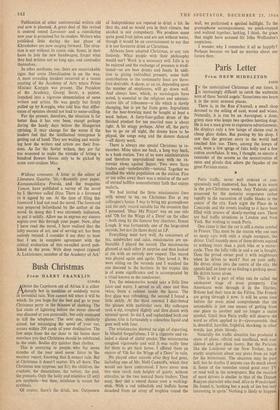Bush Christmas
From HARRY FRANKLIN LUSAKA
ACROSS the Capricorn cut of Africa it is either CROSS
hot in sunshine or soddenly warm in torrential rain. You cannot tell when it will be which. So you hope for the best and go to your Christmas party in the thinnest of clothing. The last sizzle of lightning before the storm cleared was directed at you personally, but only managed to kill the telephone. The next one, similarly aimed, but misjudging the speed of your car, occurs within 200 yards of your destination. The few steps from the car door to the house door convince you that Christmas should be celebrated in the nude. Bodies dry quicker than clothes.
This is annoying to people who for seven months of the year need never listen to The weather report, knowing that it cannot rain. But at Christmas it doesn't matter. It's all there. The Christmas tree (cypress, not fir), the children, the crackers, the decorations, the turkey, the pud, the presents. Only the holly and mistletoe (if any) are synthetic--but then, mistletoe is meant for synthesis.
Of course, there's the drink, too. Outposters
of Independence are reputed to drink a lot. So they do, and so would you in their climate, but alcohol is not compulsory. We produce some quite good fruit juices and are not without water, though it would be an overstatement to say that it is our favourite drink at Christmas.
Africans have adopted Christmas, at any rate festively. What people with their philosophy would not? Work is a necessary evil. Life is to be enjoyed and the exchange of presents is tradi- tional—so are beer drinks and feasts. In addi- tion to giving individual presents, some bulk contributions to the community feast are there- fore desirable. A sheep, or an ox, depending upon the number of employees, will go down well. And always beer, which, as sociologists have noted, is essential to the religious and adminis- trative life of tribesmen—a life which is slowly changing, but is yet far from gone. Ingredients for the beer-brewing must be bought at least a week before. A forty-four-gallon drum of the finished product for ten married men is about right. A bit stingy perhaps. After all, the party has to go on all night, the drums have to be played, the songs sung and the dances danced —all thirsty work.
There is always one special Christmas to re- member. Mine takes me back, a long way back, to a bush station. Two of us were administrators and therefore unprejudiced men with no ex- tremist views against liquor. Two were Scots traders and—unbelievably—teetotal. Together we totalled the white population on the station. Five or ten miles away there was a mission of the sort of eternal hellfire nonconformist faith that enjoys malaria.
We had invited the three missionaries (two with wives) to tea on Christmas Eve at my colleague's house. I was to bring my gramophone and the only record suitable for the occasion that I possessed. 'Hear My Prayer' was on one side and 'Oh for the Wings of a Dove' on the other —both sung by the famous boy chorister, Ernest Lough. It was fortunately one of the large-sized records, but not (in those days) an LP.
Everything went very well. As consumers of tea, sandwiches and cake, missionaries are un- beatable. I played the record. The missionaries glanced at each other in surprise and then looked at me with an entirely new respect. The record was played again and again. They loved it. We were sitting on the veranda and I watched the sun descend to the horizon. In the tropics this is of some significance and is accompanied by a ritual known as the sundowner.
Yes, the missionaries would take a little lime juice and water. I served us all, once and then twice, from a cabinet inside the house. The first glass was refreshing, the second I found a little sickly. At the third renewal I distributed the glasses with particular care. My colleague took a sip, coughed slightly and then drank with unusual speed. So did I, and replenished both our glasses. Gin is fortunately a colourless liquid and goes well with lime.
The missionaries showed no sign of departing. In blissful forgetfulness, I lit a cigarette and ex- haled a cloud of sinful smoke. The missionaries coughed vigorously and said it was really time for them to get back home. I offered them an encore of 'Oh for the Wings of a Dove' in vain.
We played other records after they had gone, including one of Mr. Noel Coward's, which they would not have understood. I have never seen two men reach such heights of gaiety, without stimulus, as the two teetotal Scots traders. They sang, they did a sword dance over a walking- stick. With a red tablecloth and buffalo horns detached from an array of trophies round the wall, we performed a spirited bullfight. To the gramophone accompaniment, we quick-stepped and waltzed together, lacking, I think, the grace that might have aroused Sir John Wolfeuden's suspicions.
I wonder why I remember it all so happily? Perhaps because we had no worries about our future then.




























 Previous page
Previous page